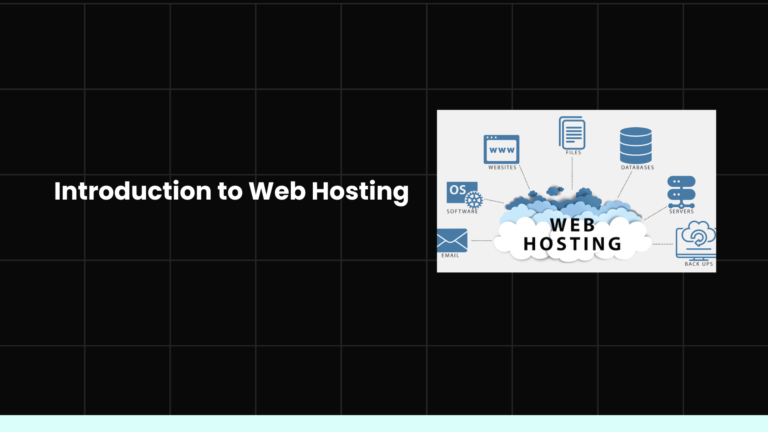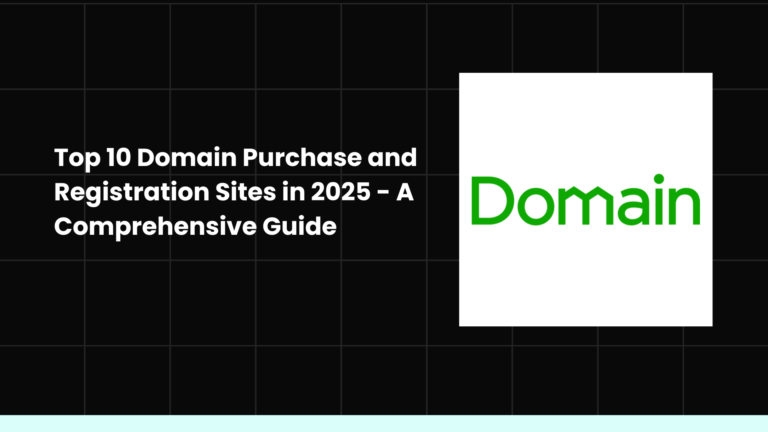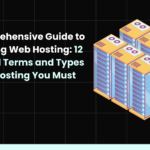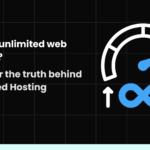Why Should You Choose a Good Web Hosting Service?
Choosing the right hosting provider is not just a technical decision; it’s a strategic one that greatly impacts the future of your digital presence. A good web hosting service is the foundation of your online existence, serving as the infrastructure for your website.
Best Web Hosting
In today’s digital world, a website is the primary point through which your business communicates with potential customers. It acts as your digital storefront, your 24/7 customer service desk, and the ambassador representing you to the entire world.
Therefore, it is crucial to choose a reliable hosting service that effectively supports your website. The hosting provider you choose is the foundation on which your digital business will grow.
The Importance of Reliable Web Hosting
To help you understand the importance of web hosting, let’s use a real-world analogy. Imagine your website is a high-speed train, and web hosting is the track the train runs on. Just as good tracks are essential for a smooth and safe journey, a good hosting service ensures that your website remains fast, secure, and always available.
By choosing reliable hosting, you can improve your site’s performance, increase its speed, and enhance its search engine ranking, contributing to an overall better user experience.
The Consequences of Choosing Unreliable Hosting
Choosing an unreliable hosting service can have severe consequences. This can lead to issues such as:
- Increased Bounce Rate: Where visitors leave your site and go to your competitors.
- Negative Impact on Profits: Due to website downtime or slow page loading.
- Negative Impact on Reputation: Leading visitors to avoid returning to your site.
Imagine your site experiencing sudden crashes or pages loading very slowly. This directly affects the user experience, and subsequently, your sales. Any security vulnerabilities in your hosting service could also put both your and your customers’ data at risk.
Real-World Example
Let’s consider a practical example: If you want to buy a product online but experience issues with page loading or payment processing failures, would you continue with the purchase? Most likely, you’d look for another store. This is what happens if your website’s hosting is unreliable: your customers will become frustrated, resulting in lost sales.
How to Choose the Best Web Hosting Service
To avoid these issues, you should select a reliable hosting service that enhances your website’s performance and ensures it runs smoothly. On Complete Guide to Hosting, we offer tips and guides to help you choose the best hosting for your site, so you can focus on developing your digital business without worrying about hosting problems.
Choosing a good web hosting service is a long-term investment in your digital success. Reliable hosting ensures excellent performance, fast loading speeds, and robust protection against security threats for your site. Don’t leave your hosting choice to chance; choose wisely to guarantee success in the ever-evolving online world.
How to Choose the Best Web Hosting
Choosing a good web hosting service can be a crucial decision for the future of your website. To avoid the mistake of selecting a bad hosting provider, the team at Complete Guide to Hosting has prepared this simplified guide, which contains practical steps to help you make the best decision.
We have divided the guide into three interconnected main steps that make the process easier for you, with a detailed explanation of each step, so you have a clear idea when starting your search for the most suitable hosting for your site.
Step 1: Define Your Hosting Needs
Understanding your actual hosting needs is the foundation for making the right choice. Think of this as if you’re planning to build a house; to ensure the hosting will be effective and suitable. Here are some factors to consider:
1. Type and Size of the Website
Are you creating a personal blog, a portfolio site, or an online store? Each type of website has different hosting requirements. For example:
- Personal blogs usually need simple hosting with flexible options.
- Portfolio sites may require hosting with strong support and high speed.
- E-commerce stores need very powerful hosting to handle high traffic and secure transactions.
At Complete Guide to Hosting, we have dedicated guides for different types of websites, such as an e-commerce hosting guide and a reseller hosting guide.
2. Estimate Traffic Volume
Estimating the number of visitors your site will receive in the first few months of operation is an important step. For instance, if you have a new website, estimate how many visitors you expect it to attract after one year. Based on these estimates, you can determine what type of hosting you need, whether it’s shared, virtual, or dedicated hosting.
3. Technical and Functional Requirements
Websites have varying technical requirements, such as:
- Content Management System (CMS): Most websites rely on systems like WordPress, Joomla, or Drupal. It’s crucial that the hosting supports these systems to ensure smooth operation of your site.
- Programming Languages and Databases: Make sure the hosting supports the programming languages your site needs, such as PHP or Python, as well as databases like MySQL or SQL Server. If you are using WordPress, choose hosting dedicated to this system for full compatibility and better performance.
Step 2: Research Leading Hosting Companies
After determining your needs, you can start looking for hosting companies that offer services that meet those needs. It’s always a good idea to read reviews and feedback from previous users to ensure you’re choosing a reliable provider.
Step 3: Filter Options and Choose the Best One
Once you find a list of suitable companies, you should filter your options based on factors such as:
- Performance and Speed: Make sure the hosting offers high loading speeds and supports the expected number of visitors.
- Technical Support: Choose a provider that offers fast and reliable technical support.
- Security: Ensure the hosting provider offers strong security protocols to protect your site and your customers’ data.
Additional Tip: Take advantage of discount coupons offered by some hosting companies to get the best deals.
By following these steps, you can choose a hosting service that meets your needs and supports your online success. Be sure to define your needs clearly before starting your search, and always stay updated on the latest offers and technologies available in the hosting field.
The Importance of Scalability in Web Hosting
When choosing hosting for your website, scalability should be a key consideration. This means the hosting service you choose must be able to adapt to your website’s growth in the future, whether that’s by adding new content or by running advertising campaigns that attract more visitors.
Why is Scalability Important?
If you have plans for growth and expansion on your website, such as increasing content or targeting a broader audience through advertising campaigns, you will need hosting that can meet your growing needs. As your site grows, your resource requirements (such as storage space, processing power, and RAM) will increase to accommodate the rise in traffic.
Therefore, it’s best to choose a hosting provider that allows for easy scaling. You should be able to move between different hosting services without needing to change your provider entirely. For example:
- Shared Hosting: A good option for small or medium-sized websites, but it may become insufficient over time.
- Virtual Private Servers (VPS): Offers more resources and flexibility.
- Dedicated Servers: Best for large websites that require strong, independent resources.
The Importance of Uptime in Web Hosting
Is uptime important for you? The answer depends on the type of website you have and its needs.
High Uptime: Refers to the percentage of time the website remains available without interruption. If your website depends on continuous access from visitors, or if you run an e-commerce store or payment platform, good uptime is critical. Every minute of downtime could mean a loss of revenue and credibility.
- Small Websites or Blogs: If you have a small website or a blog with low daily traffic, you may not need hosting with extremely high uptime. However, if you expect thousands of visitors daily or run an e-commerce store, ensuring the hosting provides at least 99.9% uptime is crucial.
How to Choose Hosting with Scalability and Good Uptime?
When choosing hosting for your site:
- Ensure Scalability: Choose a hosting provider that allows you to easily upgrade from a small hosting plan to a larger one as your site needs grow.
- Check Uptime: Choose hosting that offers at least 99.9% guaranteed uptime to ensure your website remains accessible at all times.
- Plan for the Future: Make sure the provider offers long-term solutions that will keep up with your website’s growth and future needs.
Conclusion
Choosing hosting for your site isn’t just about meeting today’s needs; you must also consider scalability and uptime to ensure long-term success. By evaluating your current needs and planning for the future of your site, you can make the most suitable decision to ensure your site remains uninterrupted, enhancing the user experience and increasing your site’s growth opportunities in a sustainable way.
Searching for Potential Providers
After determining your specific needs for your website and selecting the type of hosting you require, it’s time to research the market and choose the best web hosting provider that can meet those needs. In this section, we will guide you on how to choose the most suitable provider for your website.
Reading Reviews and Ratings of Hosting Companies
One of the most important steps in searching for web hosting is reading reviews and ratings from previous users. This helps you assess the quality of service provided by each provider. But how can you ensure the hosting service is of good quality before making a decision?
Of course, you can’t fully understand the quality of service until you experience it firsthand, but that would require you to:
- Purchase the hosting.
- Transfer your website to it, or at least a copy of it.
- Direct a number of visitors to the hosting to assess its capacity to handle traffic.
- Test the response speed of the website, especially during peak times.
- Monitor the hosting’s performance over time to assess its stability.
- Check the technologies used on the hosting platform.
- Test the customer support, which should be fast and efficient.
- Verify the transparency: Are there any undisclosed limits or policies that may appear after purchasing the hosting? For instance, some restrictions related to CPU usage.
However, even if you perform all of these actions, it might still be difficult to continuously monitor the performance of multiple hosting companies. So, what’s the solution?
Hosting Dean is the Solution!
At Hosting Dean, we do all of this on your behalf! We compare different hosting services, monitor their performance over time, and provide you with the best hosting reviews. You can regularly check out the top web hosting services of the month, an update we provide consistently.
Checking Uptime and Speed Records of Hosting Providers
Uptime and response speed are some of the key criteria we use at Hosting Dean to evaluate hosting performance. We document the uptime rate and response speed for each hosting provider, so you can review performance statistics over the past months.
- Uptime: Shows how long your website is available online without interruptions. High uptime means the site will be continuously available to users.
- Speed: The faster the hosting loads your site pages, the better the user experience.
Comparing Available Hosting Services
Once you’ve reviewed the features and drawbacks of various hosting providers through Hosting Dean reviews, compare the options based on your specific needs. Make sure that the features each hosting service offers are sufficient for you, and don’t forget to consider the disadvantages.
It’s important to ask yourself: Can I adapt to the drawbacks that may arise? Or will these drawbacks present a significant obstacle that hinders my effective use of the hosting?
Conclusion:
You are now ready to take an important step in selecting the best hosting for your website. By comparing the advantages and disadvantages based on objective reviews, and reviewing the actual performance records, you can be fully informed about the available options to make the best decision.
Choose the Right Hosting Service and Plan… at the Best Price!
After selecting the right provider for your website, the final step is to purchase the hosting service that suits your needs. Here’s how you can choose the best service while ensuring you get the best price.
Understand the Hosting Service You Need
Most hosting companies offer a variety of services based on the type of website and its needs. Here are some of the most common options:
- Shared Hosting: In this service, the server is shared among multiple clients, which helps reduce costs. It’s the ideal choice for small to medium-sized websites like blogs or personal websites.
- VPS Hosting (Virtual Private Server): This option is an upgrade from shared hosting. It allocates dedicated resources to your site, increasing speed and stability, with more control and flexibility.
- Dedicated Servers: If you need an entire server dedicated solely to your website, this is the perfect choice. It guarantees fully dedicated resources, providing you with maximum performance and flexibility.
To find the best option for you, you can look at hosting reviews for a comprehensive comparison between these hosting types, which will help you decide based on your website’s size and budget.
Choose the Right Plan
When selecting a hosting plan, you’ll find that most companies offer several plans, varying in resources like storage capacity, bandwidth, and the number of websites you can host. Here are some tips for choosing the right plan:
- Start small: If you’re just starting out, it’s preferable to begin with an affordable plan and upgrade as needed. This way, you avoid paying for resources you won’t use initially.
- Leave room for growth: Choose a plan that offers additional resources for future expansion. For example, if you need 50GB of storage, don’t settle for a plan with exactly 50GB—opt for one that offers 100GB or more.
Pay Attention to Key Factors in Hosting
Before making your final decision, be sure to pay attention to certain important aspects that might seem insignificant but can be crucial to your experience:
- The myth of “unlimited” hosting: Some companies may advertise “unlimited” services, but the reality is that these plans have hidden limits. Always check the terms of service to avoid falling into the trap of these offers.
- Refund policies and guarantees: Ensure that you understand the refund policy or the free trial period. Also, check if all services (like add-ons or domain) are included in the money-back guarantee.
- Technical support: Investigate the available support methods. Although technical support is important, the level of support needed may vary from one user to another. Do you need support via phone, or is live chat sufficient?
- Server location: The server’s location can affect your website’s loading speed in certain geographic regions. If you’re targeting an audience in a specific area, choose a server that’s geographically closer to them. However, don’t forget that using a Content Delivery Network (CDN) like Cloudflare can help improve speed globally.
- Security: Don’t compromise on the security of your website. Make sure the hosting provider offers SSL certificates, regular backups, and protection from viruses.
- Terms of service: Read the terms of service carefully to understand the limits on resource usage and any additional fees that may arise later.
Use Discount Coupons for Great Savings!
Before making the final purchase, ensure that you’re getting the best price! By purchasing through our link, you can benefit from discounts of up to 50% on some hosting services! Many companies offer exclusive discount coupons that can significantly lower your overall costs.






